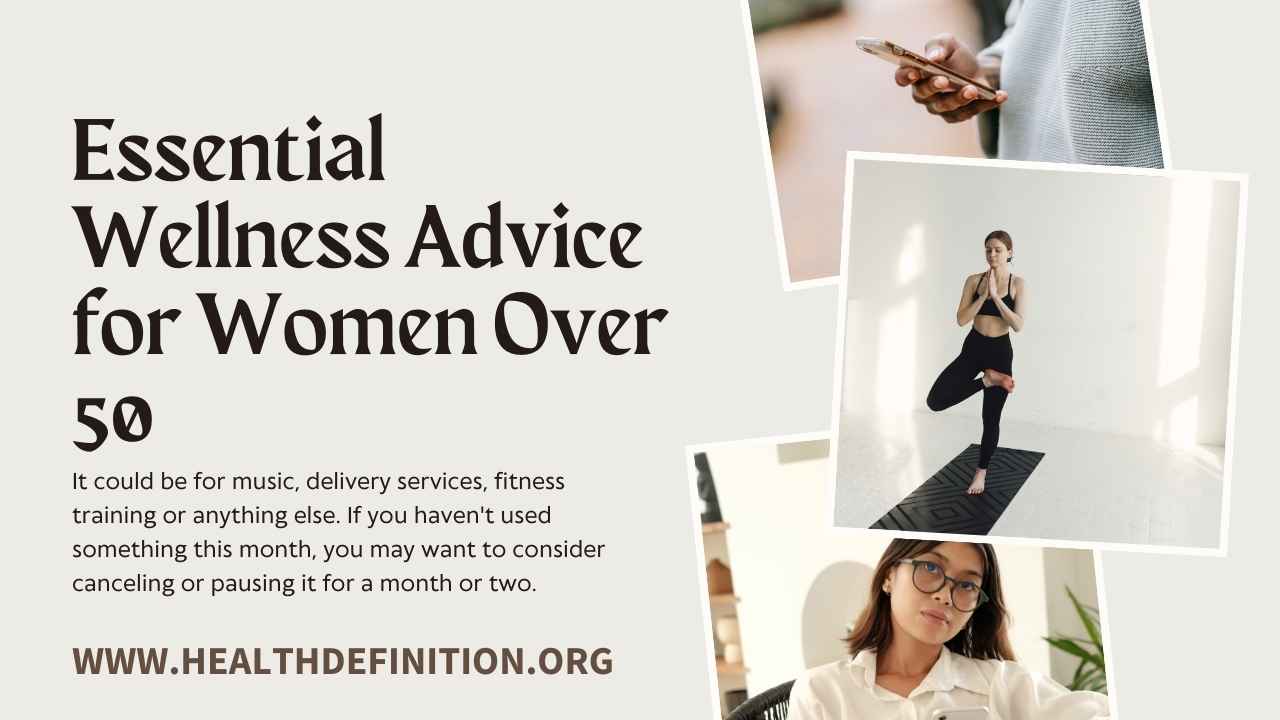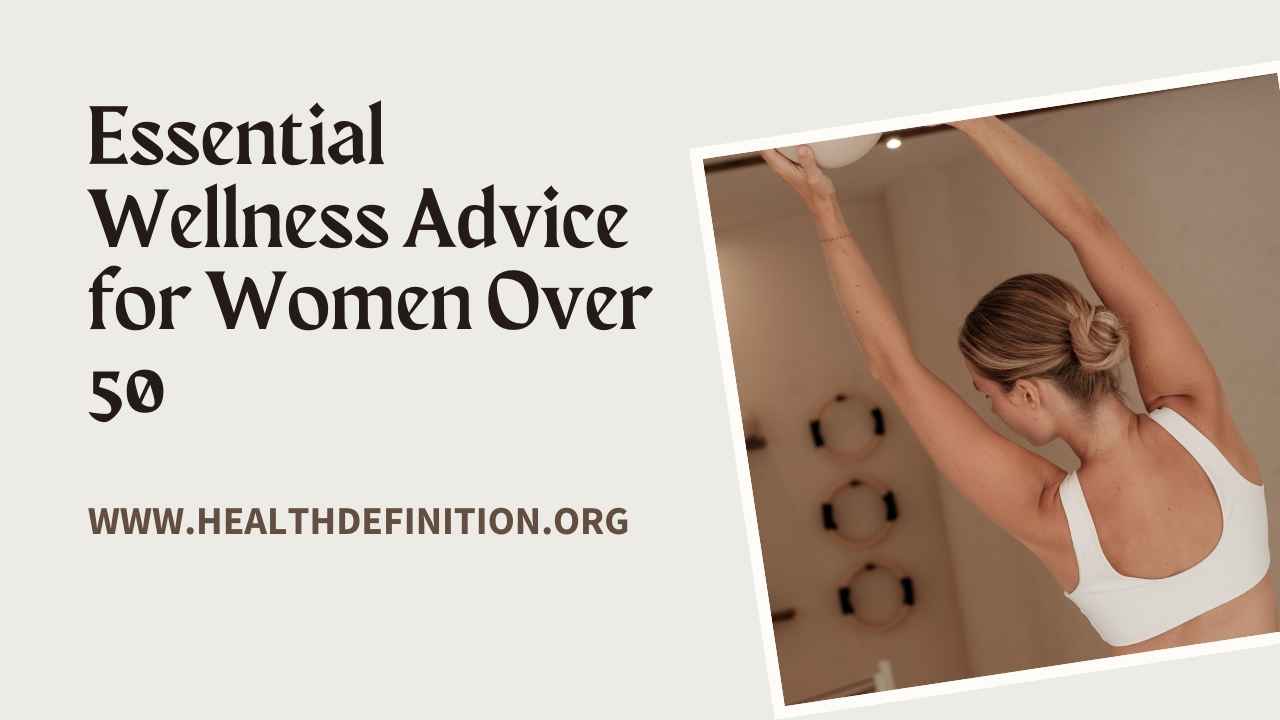
As women age, maintaining a healthy lifestyle becomes even more crucial. Women over 50 often face unique health challenges due to hormonal changes, aging processes, and an increased risk of chronic conditions. However, by embracing healthy habits and making informed choices, women can age gracefully and improve their quality of life. Here’s a comprehensive guide to health tips for women over 50 that can help you thrive in your prime years.
Prioritize a Balanced Diet
A balanced diet is essential for overall health, particularly as you age. As metabolism slows down, maintaining an optimal weight and ensuring your body gets all the nutrients it needs is vital. Focus on incorporating the following into your diet:
- Fiber-Rich Foods: Foods like whole grains, fruits, vegetables, and legumes can aid digestion and prevent constipation, which is common after 50. Fiber also helps regulate blood sugar levels, reducing the risk of diabetes.
- Protein: As muscle mass naturally declines with age, it’s important to consume enough protein to maintain and repair muscle tissue. OPT for lean sources of protein such as chicken, fish, beans, and tofu.
- Calcium and Vitamin D: Osteoporosis becomes a major concern for women after 50 due to lower estrogen levels. Calcium-rich foods like leafy greens, dairy, and fortified non-dairy milk, paired with Vitamin D from the sun or supplements, can help support bone health.
- Healthy Fats: Omega-3 fatty acids, found in fatty fish like salmon and plant-based sources like flaxseeds and walnuts, support heart health and reduce inflammation.
Incorporating these healthy foods into your diet will help you maintain a healthy weight, support muscle mass, and keep your bones strong.

Stay Hydrated
- Decreased Water Retention with Age: As you age, your body’s ability to retain water naturally decreases. This can make dehydration more likely, leading to various health issues.
- Health Consequences of Dehydration: Dehydration can cause fatigue, headaches, dizziness, dry skin, and even kidney problems. It also affects digestion and can lead to constipation.
- Hydration Targets: Aim to drink at least 8 cups (64 ounces) of water daily. If you are physically active or live in a hot climate, you may need more water to stay properly hydrated.
- Water-rich Foods: Incorporate water-rich foods into your diet to boost hydration. Foods like cucumbers, watermelon, oranges, and strawberries contain high water content and can help keep you hydrated.
- Monitor Your Fluid Intake: Pay attention to your body’s signs of dehydration, such as dry mouth or feeling thirsty. Also, ensure you’re drinking enough water throughout the day, not just when you’re thirsty.
- Hydration for Overall Health: Proper hydration supports kidney function, regulates body temperature, boosts energy, and improves skin health, all of which are essential for overall well-being, especially as you age
Get Regular Exercise
Regular physical activity is one of the best ways to maintain health and prevent disease after 50. Exercise helps reduce the risk of chronic conditions like heart disease, type 2 diabetes, and high blood pressure. Additionally, it can improve your mood and energy levels, reduce stress, and support healthy aging.
Aim for a combination of the following:
- Cardiovascular Exercise: Walking, swimming, or cycling can improve heart health and stamina. Aim for at least 150 minutes of moderate aerobic activity per week.
- Strength Training: Strength training exercises help maintain muscle mass, support bone density, and improve metabolism. Include resistance exercises at least two days a week.
- Flexibility and Balance: Activities such as yoga or tai chi improve flexibility, balance, and mental clarity. These are especially important as you age to prevent falls and maintain mobility.
Prioritize Mental Health
Mental health is just as important as physical health. Women over 50 may face life changes such as retirement, empty nest syndrome, or caring for aging parents, which can lead to stress, anxiety, or depression. Prioritizing mental health is crucial for overall well-being.
- Manage Stress: Practice stress-reducing techniques such as meditation, deep breathing exercises, or journaling. These practices help calm the mind and manage anxiety.
- Stay Socially Connected: Engage with family, friends, and community groups. Socializing and having meaningful relationships can reduce the risk of loneliness and improve emotional health.
- Learn New Things: Keep your mind active by learning new skills, whether it’s picking up a new hobby, taking a class, or reading books. This helps maintain cognitive function and boosts self-esteem.
Regular Health Screenings
Health screenings are essential to catch potential issues early, and women over 50 should stay on top of their check-ups. Early detection of conditions like breast cancer, cervical cancer, and high blood pressure can save lives. Be proactive and schedule the following regular screenings:
- Mammograms: Women over 50 should have a mammogram every 1-2 years to screen for breast cancer.
- Pap Smear and Pelvic Exam: Routine Pap smears can detect cervical cancer or other abnormalities. These exams are typically recommended every 3 years, but your doctor may advise more frequent screenings based on your health history.
- Bone Density Test: A bone density test helps diagnose osteoporosis or a higher risk of fractures. This is recommended for women over 65 or those with risk factors for osteoporosis.
- Cholesterol and Blood Pressure Checks: Regular screenings for cholesterol levels and blood pressure are essential for heart health. These should be done annually or as advised by your healthcare provider.
- Eye and Hearing Tests: As you age, your vision and hearing may change. Schedule regular eye exams and hearing tests to detect any issues early.

Sleep Well
Sleep plays a crucial role in physical and mental health, and women over 50 may experience sleep disturbances due to hormonal changes like menopause. Prioritize good sleep hygiene to improve sleep quality:
- Create a Sleep Routine: Go to bed and wake up at the same time every day to regulate your internal clock.
- Limit Caffeine and Alcohol: Both caffeine and alcohol can disrupt sleep, so try to avoid them several hours before bedtime.
- Optimize Your Sleep Environment: Keep your bedroom dark, quiet, and cool. Consider using blackout curtains, earplugs, or a white noise machine to create an optimal sleeping environment.
If you’re experiencing persistent sleep issues, consult with a healthcare provider for further advice.
Focus on Skin Care
As you age, your skin undergoes various changes. Collagen production decreases, leading to thinner, drier skin. Wrinkles, age spots, and other skin concerns may become more prominent after 50.
Maintain healthy skin by:
- Moisturizing Regularly: Use a rich moisturizer to keep your skin hydrated and prevent dryness, especially during colder months.
- Sun Protection: Sun exposure is one of the leading causes of skin aging. Always apply sunscreen with SPF 30 or higher before going outside, even on cloudy days.
- Gentle Skin Care Routine: Avoid harsh skin products that may irritate your skin. Opt for gentle, non-comedogenic products that hydrate and protect your skin.
Quit Smoking and Limit Alcohol Consumption
- Quit Smoking for Better Health: Smoking accelerates aging, increases the risk of heart disease, cancer, and lung conditions, and damages skin health by causing wrinkles and dullness.
- Reduce Cancer Risks: Quitting smoking significantly lowers the risk of cancer, including lung, throat, and oral cancers.
- Moderate Alcohol Consumption: Limit alcohol intake to one drink per day to support liver health and reduce the risk of alcohol-related cancers.
- Protect Mental Health: Excessive alcohol consumption is linked to mental health issues like depression and anxiety.

Conclusion
Health tips for women over 50 are not just about surviving— they are about thriving. By prioritizing a balanced diet, staying active, managing stress, scheduling regular health screenings, and taking care of mental and physical health, women can enjoy their golden years with vitality and joy. Embrace these health tips, and remember that it’s never too late to make positive changes for a healthier, happier life.
FAQs about “health tips for women over 50”
What are the best exercises for women over 50?
The best exercises for women over 50 include a mix of cardiovascular, strength, and flexibility training. Activities like walking, swimming, or cycling improve heart health and stamina. Strength training, such as weightlifting or resistance exercises, helps maintain muscle mass and bone density. Yoga or Pilates enhances flexibility and balance, reducing the risk of falls.
How can women over 50 maintain a healthy weight?
Maintaining a healthy weight after 50 involves a combination of a balanced diet and regular exercise. Focus on eating nutrient-dense foods like lean proteins, whole grains, and plenty of fruits and vegetables. Portion control and mindful eating can help prevent overeating. Consistent physical activity, including strength training and cardio, also plays a key role in weight management.
What should women over 50 eat for better bone health?
To support bone health, women over 50 should consume foods rich in calcium and vitamin D. Dairy products like milk, yogurt, and cheese, as well as fortified plant-based milk, are great sources of calcium. Vitamin D, essential for calcium absorption, can be found in fatty fish, egg yolks, and sunlight exposure. Incorporating leafy greens, almonds, and fortified foods can also help strengthen bones.
How can women over 50 improve mental health?
Mental health can be supported by staying socially connected, engaging in hobbies, and practicing mindfulness. Regular exercise has positive effects on mood, and stress management techniques like meditation or journaling can improve emotional well-being. Getting adequate sleep and eating a nutrient-rich diet also contribute to mental health.
What health screenings are recommended for women over 50?
Women over 50 should have regular health screenings, including mammograms for breast cancer, Pap smears for cervical cancer, and bone density tests for osteoporosis. Blood pressure, cholesterol levels, and glucose should also be monitored. Consult your doctor for personalized recommendations based on your health history.
Bullet points about ” health tips for women over 50″
- Prioritize a Balanced Diet: Focus on eating nutrient-rich foods like lean proteins, fruits, vegetables, whole grains, and healthy fats. This helps support overall health and manage weight.
- Incorporate Strength Training: Include resistance exercises 2-3 times a week to maintain muscle mass, improve metabolism, and boost bone density.
- Stay Active with Cardio: Regular cardiovascular activities like walking, swimming, or cycling improve heart health, and stamina, and help with weight management.
- Focus on Bone Health: Ensure adequate calcium and Vitamin D intake through foods like dairy, leafy greens, and fortified plant-based options to strengthen bones and prevent osteoporosis.
- Manage Stress and Mental Health: Engage in relaxation techniques like yoga, meditation, or deep breathing, and maintain social connections to support mental well-being.
- Regular Health Screenings: Schedule routine check-ups like mammograms, Pap smears, blood pressure checks, and bone density tests to detect early health issues and prevent chronic diseases.






